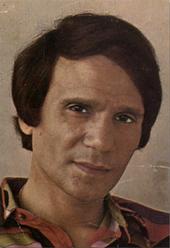Abdel Halim Isma'el Shabana ommonly known as Abdel Halim Hafez (June 21, 1929 – March 30, 1977), was one of the most popular Egyptian singers and actors not only in Egypt but throughout the Middle East from the 1950s to the 1970s. He is widely considered to be one of the four 'greats' of Egyptian and Arabic music. Abdel Halim's music is still played on radio daily in Egypt and the Arab world. His name is sometimes written as 'Abd el-Halim Hafez, and he was also sometimes known as el-Andaleeb el-Asmar (the Dark Nightingale) , on account of his sweet voice.Contents BiographyHe was born Abdel Halim Ali Ismail Shabana in El-Hilwat, in e-Sharqiyah Governorate, 80 kilometres (50 miles) north of Cairo, Egypt. Abdel Halim was the fourth child of Sheikh Ali Ismail Shabana. He had two brothers, Ismail and Mohammed, and one sister, Aliah. Abdel Halim's mother died from complications after giving birth to him, and his father died five months later, leaving Abdel Halim and his siblings orphaned at a young age. Abdel Halim was raised by his aunt and uncle in Cairo.His musical abilities first became apparent while he was in primary school, and his older brother Ismail Shabana was his first music teacher. At the age of 11 he joined the Arabic Music Institute in Cairo and became known for singing the songs of Mohammed Abdel Wahab. He graduated from the Higher Theatrical Music Institute as an oboe player.While singing in clubs in Cairo, Abdel Halim was drafted as a last-minute substitute when singer Karem Mahmoud was unable to sing a scheduled live radio performance in honor of the first anniversary of the 1952 Revolution, on June 18, 1953. Abdel Halim's performance was enormously popular with the live audience, and was heard by Hafez Abd El Wahab[1], supervisor of musical programming for Egyptian national radio, who decided to support the then unknown singer. Abdel Halim took Hafez Abdel Wahab's first name as his stage-surname in recognition of his patronage.Abdel Halim went on to become one of the most popular singers and actors of his generation, and is considered one of the four greats of Egyptian and Arabic music, along with Umm Kalthoum, Mohammed Abdel Wahab and Farid Al Attrach.Abdel Halim never married, although rumours persist that he was secretly married to actress Souad Hosni for six years. Both Abdel Halim and Souad Hosni's friends continue to deny the marriage even to this day. Interestingly, Souad Hosni died on Abdel Halim's birthday (June 21) in 2001.Despite this, Abdel Halim only truly fell in love once, in his youth. He fell in love with a young woman whose parents refused to allow them to marry. After four years, her parents finally approved, but the girl died of a chronic disease before the wedding. Abdel Halim never recovered from her loss, and dedicated many of his saddest songs to her memory, including Fi Youm, Fi Shuher, Fi Sana (In a Day, a Month, a Year) and the poignant Qariat el-Fingan (The Fortune-teller).At the age of 11 Abdel Halim contracted Bilharzia – a parasitic water-born disease – and was periodically and painfully afflicted by it. During his lifetime, many artists and commentators accused Abdel Halim of using his Bilharzia to gain sympathy from female fans. His death of the disease put to rest such accusations.Abdel Halim died on March 30, 1977, a few months short of his 48th birthday, while undergoing treatment for Bilharzia in King's College Hospital, London. His funeral (in Cairo) was attended by thousands of people – more than any funeral in Egyptian history except those of President Nasser (1970) and Umm Kalthoum (1975). Four women committed suicide on hearing of his death. He is buried in Al Rifa'i Mosque in Cairo.His music can still be heard every day across the Arab world, and he is still considered one of the four 'greats' of Arabic music. Further, he is today seen as the most famous and popular singer in the arab world, in so far as he is the artist whose discs have been the most sold since his death (even more than Oum Kalthoum).Abdel Halim Hafez's song Khosara enjoyed international fame in 1999 when the American rap superstar Jay-Z used it as the background for his hit "Big Pimpin'".His most famous songs include Ahwak ("I love you"), Khosara ("A pity"), Gana El Hawa ("Love, come to us"), Sawah ("Wanderer"), Zay el Hawa ("It feels like love"), and El
Create or get your
very own MySpace Layouts
